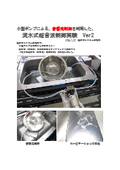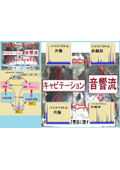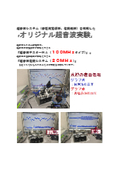- Cleaning method using an ultrasonic toothbrush (130 Hz and 1.6 MHz) -
The Ultrasonic System Research Institute has developed ultrasonic cleaning technology that enables control of acoustic flow (ultrasonic propagation state) in the range of 1-100 MHz by utilizing an ultrasonic toothbrush (130 Hz and 1.6 MHz, 3 W).
This is a new application technology for precision cleaning, processing, and stirring based on the measurement, analysis, evaluation, and technology of ultrasonic propagation states.
By utilizing the acoustic properties (surface elastic waves) of various materials, ultrasonic stimulation to the target object can be controlled even in a 1000-liter tank with a 3 W ultrasonic output.
It was developed as an application method for nonlinear phenomena through an engineering (experimental and technical) perspective on elastic wave propagation and an abstract algebraic ultrasonic model.
The key point is the use of tools (elastic bodies: metal, glass, resin). By confirming the propagation characteristics of ultrasonic waves depending on the conditions of the target object, it is important to address this as an original nonlinear resonance phenomenon (Note 1).
Note 1: Original Nonlinear Resonance Phenomenon
This phenomenon occurs due to the generation of harmonics resulting from original oscillation control, which is realized at high amplitudes through resonance phenomena, leading to ultrasonic vibration resonance.


Inquiry about this news
Contact Us Online
Related Documents
Related product
Related catalog(14)






























